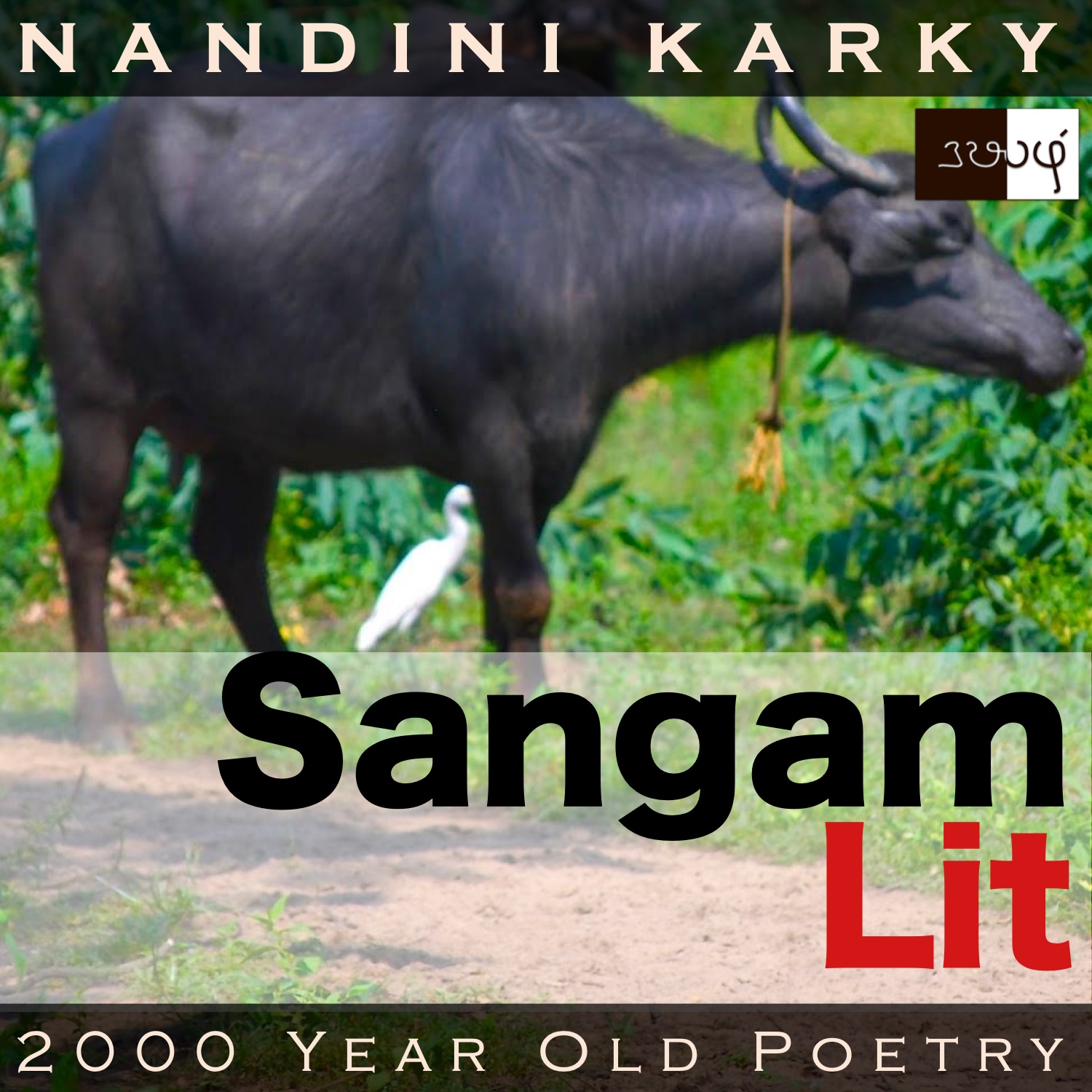Podcast: Play in new window | Download
Subscribe: Apple Podcasts | Spotify | Amazon Music | Android | iHeartRadio | TuneIn | RSS | More

In this episode, we perceive the conviction in a married lady about the way to be, as portrayed in Sangam Literary work, Kurunthogai 181, penned by Killimangalam Kizhaar. Set in the farmlands of ‘Marutham’, the verse speaks in the voice of the lady to her confidante, in response to the confidante’s words of rebuke about the man.
இது மற்று எவனோ-தோழி!-துனியிடை
இன்னர் என்னும் இன்னாக் கிளவி-
இரு மருப்பு எருமை ஈன்றணிக் காரான்
உழவன் யாத்த குழவியின் அகலாது,
பாஅல் பைம் பயிர் ஆரும் ஊரன்
திரு மனைப் பல் கடம் பூண்ட
பெரு முது பெண்டிரேம் ஆகிய நமக்கே?
‘No point in words of ill-will’ declares this verse! The opening line ‘இது மற்று எவனோ-தோழி’ meaning ‘what could be the use of this, my friend?’ puts forth a sharp question. ‘இன்னாக் கிளவி’ meaning ‘hostile words’ gives us a clue that harsh words have been uttered. From this, the poem moves to the farm setting and talks about ‘இரு மருப்பு எருமை ஈன்றணிக் காரான்’ meaning ‘a black buffalo with long horns, one which has given birth recently’. The phrase ‘குழவியின் அகலாது’ meaning ‘does not part from its calf’ depicts the devotion of an animal mother to its little one. In the words ‘திரு மனைப் பல் கடம் பூண்ட’ meaning ‘in the marital home, having many responsibilities’ details the expectations on a person after marriage. Note how this ancient word ‘கடம்’ meaning ‘duty’ has transformed into ‘கடமை’ in contemporary Tamil and is a word of much significance in public life today. ‘Ending with ‘பெரு முது பெண்டிரேம் ஆகிய நமக்கே’ meaning ‘we, who are old and mature women’, the verse welcomes us to learn more from them.
What does that mother buffalo and these mature women have to show us? The context reveals that the man and lady were leading a married life when the man took to keeping the company of courtesans. This fills the lady with worry. Thinking it would be comforting to the lady, the confidante speaks against the man’s behaviour to the lady. To her friend, the lady says, “What is the use of this, my friend? In this time of disunity, you say disagreeable words saying he is such and such. The huge horned, dark buffalo that has given birth recently does not move away from its calf tied up by the farmer, and grazes the green grass close by, in the village of the lord. For, in his married home, we are mature, old women with many duties to perform!” With these words, the lady refuses to put up with the confidante’s harsh expressions about the man and speaks clearly about the way forward.
Purpose seems to emanate from the lady’s words. Let’s explore the nuances hiding within. The lady starts by asking a pointed question to her friend, asking what good will the angry words spoken in that time of estrangement bring? Then, she goes on to describe a huge horned buffalo, which has recently given birth, and focuses on how this new mother doesn’t part away from her calf tied up securely by the farmer. Instead, it munches on the green grass growing near where the calf stands. Such is the man’s town, the lady says. Then, she goes on to talk about how in her home, where she makes a life with her husband, she has many duties to fulfil, being the mature, old woman that she is!
Do not be fooled by the lady’s words that she’s old. Remember how they talk of the lady as ‘a young girl playing with dolls’ when she elopes with the man. Projecting that, we can conclude a few years has passed by from then and probably the lady is a mother as well. That scene of the buffalo grazing close by to its calf holds a metaphor for the lady’s belief that although the man has strayed away towards the courtesans, his love for her remains, akin to that mother buffalo for its young one. In the end, the verse makes a strong case for avoiding words of hatred towards another. These are of no use, whatsoever, it implies. Instead, the thing to do is to reflect on how we can do what we are meant to be doing and trust that answers will appear in time!




Share your thoughts...